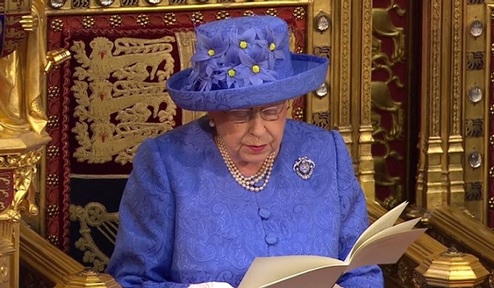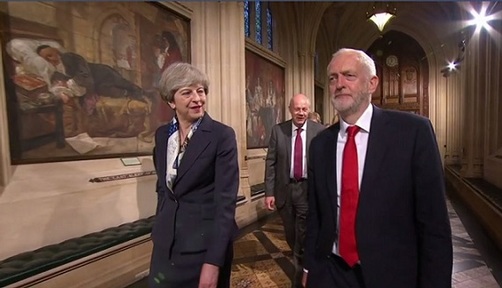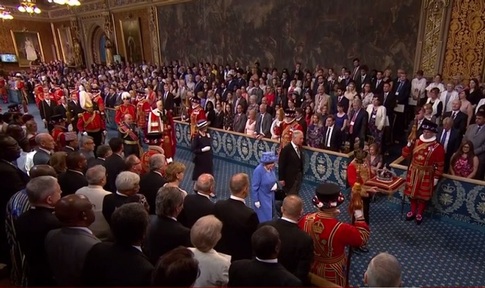PM's 'dementia tax' ditched like the Queen's crown
As the Queen’s Speech announced the Government’s plans, there was no mention of the Conservative’s election pledge of a dementia tax or a social care cap. 
Instead, Her Majesty ditched her crown for a blue sun hat and told the masses there would be a social care consultation with the words: "My ministers will work to improve social care and will bring forward proposals for consultation".
The centrepiece of the Conservatives' manifesto, the so called 'death tax' is thought to be one of the reasons the Tories lost so many seats in the General Election.
Under the plans, people getting home care would pay if they have more than £100,000 in assets which would include their house. Up till now, property has not been included as an asset for people in receipt of home care.
Midway through the election campaign, Theresa May made a U-turn and promised to cap the cost of care.
However the damage was already done with the Tories alienating some of their key voters.
Government to consult on further reform
The Cabinet Office elaborated on the Queen's Speech saying this will mean the Government 'will work to address the challenges of social care for our ageing population, bringing forward proposals for consultation to build widespread support'.
While highlighting that Prime Minister Theresa May had already invested an extra £2 billion ‘to put social care on a more stable footing and alleviate short-term pressures across the health and care system', the Whitehall department admitted: ‘However, further reform is required to ensure that the system is prepared to meet the challenges of the increasing numbers of over 75s.
The number of people aged 75 and over is expected to rise by 70 per cent between 2015 and 2035.
The Department stated: ‘To address these questions, the Government will work with partners at all levels, including those who use services and who work to provide care, to bring forward proposals for public consultation. The Government will consult on options to encourage a wider debate.’
Variation in care provider CQC ratings
It added there was a 'variation in the proportion of care providers rated ‘Good’ or ‘Outstanding’ by the Care Quality Commission between the highest and lowest council areas in England. 'The consultation will set out options to improve the social care system and to put it on a more secure financial footing, supporting people, families and communities to prepare for old age, and address issues related to the quality of care and variation in practice.’
Written by the Government, the Queen's Speech was read at the State Opening of Parliament on 21 June. This year, it was hastily put together with less pomp and ceremony than usual with the Queen ditching her usual attire because the snap election and Theresa May’s minority Government election result, meant rehearsals with full ceremonial robes and crown had to be scrapped.
Cheery buds are not from May
While a little bit of cheer seemed to spring from the bright yellow buds bedecking the Queen’s hat, social care leaders could only hope that a consultation that allows a wider debate on social care would give much needed cheer to the sector and those needing care.
Bridget Warr, chief executive of UKHCA (United Kingdom Homecare Association) welcomed the Government’s pledge to address the challenges of social care and bring forward proposals for consultations on the sector, saying "this is vital and urgent".
She added: "The UK needs plans to guarantee a long term sustainable solution to ensure people needing care are properly supported and home care providers are able to continue delivering that care into the future.
"We must ensure that the consultation adds up to more than just words and results in real positive action."
Neil Heslop, chief executive of the disability charity, Leonard Cheshire Disability expressed "deep concern" over the lack of details on proposed action on the social care crisis in the Queen’s Speech. He added: "We repeat our urgent calls for a long-term, cross party solution to funding social care. Without that, we fear social care reform is doomed to fail, and will not address fundamental gaps in help for disabled people.
"Working age disabled adults make up a third of social care users and just under half of disabled adults who say they need social care do not receive any support at all. It is hugely disappointing that their needs seem to have disappeared from the Government’s priorities."
Dan Scorer, head of policy for the learning disability charity Mencap, said: ‘It is crucial that any social care consultation following today’s Queen’s Speech, addresses the needs of working age people with a learning disability, who are too often forgotten in debates on social care funding."

Brexit: Repeal Bill
Some 27 bills and draft bills form the Government’s plans, with eight related to Brexit.
In her speech, the Queen said: "A bill will be introduced to repeal the European Communities Act and provide certainty for individuals and businesses. This will be complemented by legislation to ensure that the United Kingdom makes a success of Brexit."
The Government will repeal the European Communities Act 1972 and convert EU law into UK law as the UK leaves the EU. It will create temporary powers to make secondary legislation, enabling corrections to be made to the laws that do not operate well once the UK has left the EU. It will also allow changes to be made to domestic law to reflect the content of any withdrawal agreement under Article 50.
The Government has cancelled 2018's Queen's Speech and instead the 2017 speech will cover a two-year period to give MPs more time to debate Brexit legislation.
Mental health
The Queen also announced her Government will “reform mental health legislation and ensure mental health is prioritised in the NHS in England." The number of detentions made under the Mental Health Act is rising – there were 63,622 uses of the Act in 2015-16, an increase of nine per cent on the year before, and up 47 per cent compared to 2005-06.
The Cabinet Office stated: 'The further £1 billion a year committed by 2020/21 for mental health started to enter the system in April 2017. This will improve services – putting Crisis Resolution and Home Treatment teams on a 24/7 footing, making more mental health response teams available in A&E'.
Staff Wages
Her Majesty said the Government will also “make further progress to tackle the gender pay gap".
The National Living Wage will also be increased, “so that people who are on the lowest pay benefit from the same improvements in earnings as higher paid workers.”
The speech also included a pledge to continue to support international action against climate change, including the implementation of the Paris Agreement and ‘initiate a full public inquiry into the tragic fire at Grenfell Tower’.
Repeal Bill and dementia research

The Alzheimer's Research UK, the UK dementia research charity, has called for the Government to renew its commitment to funding research into dementia. The charity’s call comes as it fears the so-called Repeal Bill could see other issues fall from the political agenda.
Before the election, a commitment to invest in dementia research was included in the Conservative Party's manifesto but it did not detail what level of funding could be expected, or how this commitment would be maintained beyond the 2020 Challenge on Dementia.
Dr Matthew Norton, director of policy and strategy at Alzheimer's Research UK, said: “The Conservatives’ manifesto ahead of the election included a commitment to invest in dementia research, and the new Government must make good on this promise.
"We’ve seen the start of real political action against dementia in recent years, but dementia research is still playing catch-up compared to other serious conditions and we cannot afford to lose momentum now.
"It’s clear that preparations for our exit from the EU will dominate this Parliament, but it’s absolutely vital that dementia should not slip from the agenda as a result."
Latest News Analysis
 04-Sep-19
Extra £1.5 billion announced for social care in Chancellor's Spending Review
04-Sep-19
Extra £1.5 billion announced for social care in Chancellor's Spending Review
 02-Jul-19
Department of Health forced to rethink care homes' nursing rates after legal challenge
02-Jul-19
Department of Health forced to rethink care homes' nursing rates after legal challenge
 18-Jun-19
Overnight care workers forced to sleep in offices and told 'bring your own bedding'
18-Jun-19
Overnight care workers forced to sleep in offices and told 'bring your own bedding'
 14-Jun-19
Back in the closet: Third of care home staff have had no LGBT+ awareness training
14-Jun-19
Back in the closet: Third of care home staff have had no LGBT+ awareness training
 11-Jun-19
PM candidates on social care: Rory Stewart calls fixing care an 'unfinished revolution'
11-Jun-19
PM candidates on social care: Rory Stewart calls fixing care an 'unfinished revolution'